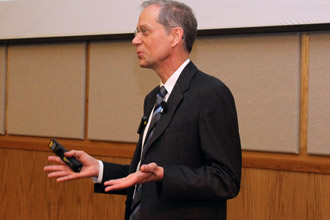Dr. Tom Farley takes on tobacco and soda
Dr. Tom Farley, Tulane University alumnus and former department chair in the Tulane School of Public Health and Tropical Medicine, spoke at Tulane twice last week on the topic of “Saving Gotham.” Farley, who is now the 2014 Tisch Distinguished Fellow in Public Health at City University of New Yorkâ“Hunter College, recently stepped down as commissioner of the New York City Department of Health and Mental Hygiene, a position he held since 2008.

Dr. Tom Farley, a Tulane alumnus and former New York City health commissioner, tells an audience at Tulane how marketing and market-based approaches helped the Big Apple get healthier. (Photo by Deirdre Boling)
Those approaches included “tough” video campaigns showing the negative effects of smoking and sugary beverages, increased taxes on cigarettes and sugary drinks, and regulations to limit drink sizes and the ability to purchase unhealthy beverages with government-sponsored assistance.
Some efforts were successful. When tax increases brought the price of a pack of cigarettes to about $11 in New York, smoking dropped to 14 percent from about 22 percent in 2002.
“It was the happiest day in the Bloomberg years,” said Farley, referring to the city's mayor who strongly supported the department's efforts.
Other efforts, however, did not get off the ground, such as limits on the maximum portion size of sugary drinks. Lawsuits followed and prevented implementation, and the city is fighting back on appeal. Even without implementation, however, sugary drink consumption went down following the firestorm of media attention the effort drew, Farley said.
Current statistics show heart disease in New York City is down, life expectancy is up, and health disparities between white and black citizens have narrowed. Farley doesn't think his department can take full credit for the positive changes, but feels confident they played a part. He was especially excited to see that during the recent New York City mayoral campaign, The New York Times included a public health platform for each candidate.
“We put public health on the political map. That was exciting.”
Dee Boling is director of communications for the School of Public Health and Tropical Medicine.
